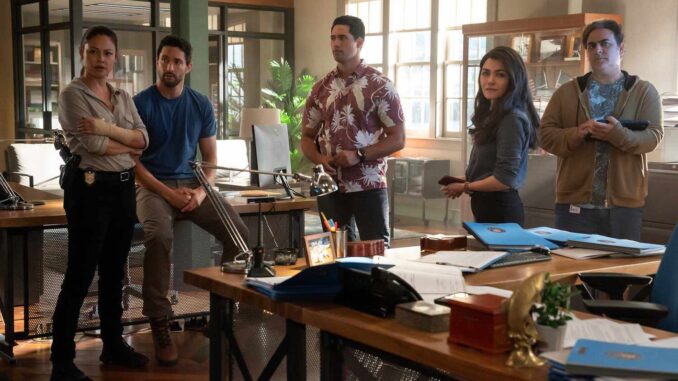
Fans were shocked to hear that “NCIS: Hawai’i,” the newest series in CBS‘ “NCIS” franchise, had been canceled after three seasons last week. At a press briefing in Los Angeles, CBS executives said the decision came down to a balance of cost and ratings, as well as cohesion across the network’s 2024-2025 schedule.
“It is incumbent on us to always keep the schedule fresh, keep momentum going. We had to make some really tough choices this year,” CBS Entertainment president Amy Reisenbach told reporters. “Everything came back [from the Hollywood strikes] really strong, but ultimately we have to look at the cohesiveness of the schedule flow. We have to evaluate the financials and the performance overall, and we make tough decisions.” When asked whether there was a chance of un-cancellation, as happened when CBS reversed its decision to end “S.W.A.T.” on two separate occasions, Reisenbach said no.
Season 3 of “NCIS: Hawai’i” opened to a strong 5.6 million average viewers on Feb. 12. While the season hasn’t reached that height again, it has managed to stay above 5 million viewers with the exceptions of Episodes 6 and 7, which still hit a solid 4.8 million and 4.98 million viewers, respectively. Those achievements, however, weren’t enough against the price tag of the series, which shoots on location in Hawai’i. CBS president and CEO George Cheeks cited financial considerations again when acknowledging that while some other popular CBS series, like “S.E.A.L. Team” and “Evil,” became Paramount+ originals after no longer fitting into the network’s primetime slate.
The abrupt cancellation of CBS’s “NCIS: Hawai’i” after just three seasons left fans and industry insiders alike searching for answers. Despite boasting impressive viewership numbers and a dedicated fanbase, the show was axed in April 2024. CBS cited “financials and performance overall” as the primary reasons for the decision. But what does that really mean? Let’s delve into the factors that led to the show’s untimely demise.
The Rise and Fall of ‘NCIS: Hawai’i’
A Promising Start
Premiering in September 2021, “NCIS: Hawai’i” introduced viewers to Jane Tennant, portrayed by Vanessa Lachey, the first female lead in the NCIS franchise. Set against the picturesque backdrop of Hawaii, the series quickly garnered attention for its fresh perspective and diverse cast. By its third season, the show was averaging over 5 million viewers per episode, a commendable feat in today’s competitive television landscape .
The Cliffhanger That Left Fans Hanging
Season 3 concluded with a gripping cliffhanger, leaving many fans eagerly anticipating a resolution. However, CBS’s decision to cancel the series meant that these storylines would never come to fruition, leading to widespread disappointment among the show’s loyal audience .
Financial Factors: The High Cost of Production
Expensive Island Filming
Filming in Hawaii is no small feat. The logistical challenges and high costs associated with shooting on location in the islands significantly inflated the show’s production budget. Estimates suggest that CBS spent approximately $75 million per season on “NCIS: Hawai’i,” a substantial investment that may not have been sustainable given the show’s performance .
Budget Cuts and Concessions
In an attempt to secure a fourth season, the producers and cast of “NCIS: Hawai’i” agreed to significant budgetary cuts and other concessions. Despite these efforts, CBS ultimately decided that the show’s financial demands outweighed its returns, leading to its cancellation .
Performance Metrics: Ratings and Audience Demographics
Declining Viewership
While the show started strong, its viewership began to decline over time. The third season’s average viewership of 5.6 million per episode was a drop from earlier seasons, signaling a potential waning interest .
Target Audience Challenges
Networks often aim to attract a younger demographic, which is highly coveted by advertisers. “NCIS: Hawai’i” may not have resonated as strongly with this group, affecting its overall performance and appeal to advertisers .
The Competitive Landscape: Too Many NCIS Shows?
Franchise Fatigue
The NCIS franchise has expanded significantly over the years, with multiple spin-offs airing simultaneously. This oversaturation may have led to audience fatigue, making it harder for each show to maintain a unique identity and dedicated viewership .
Scheduling Conflicts
CBS’s packed programming schedule left little room for “NCIS: Hawai’i.” With the introduction of new series and the renewal of existing ones, the network had to make tough decisions about which shows to keep. Unfortunately, “NCIS: Hawai’i” didn’t make the cut .

The Impact on Hawaii’s Economy
Job Losses in the Local Industry
The cancellation of “NCIS: Hawai’i” had a ripple effect on Hawaii’s economy. The production employed hundreds of local workers, from crew members to small business owners providing services. The show’s end meant the loss of these jobs, affecting the local economy .
Decline in Film Tourism
Hawaii has long been a popular destination for film productions. The end of “NCIS: Hawai’i” may deter future projects from choosing the islands as a filming location, potentially impacting tourism and local businesses that benefited from the influx of production crews and fans .
Fan Reactions: A Call for Revival
Petitions and Social Media Campaigns
In the wake of the cancellation, fans launched multiple petitions and social media campaigns urging CBS to reconsider its decision. One petition garnered over 44,000 signatures, demonstrating the show’s strong fanbase and their desire for its return .
Celebrity Support
Cast members, including Vanessa Lachey, expressed their disappointment and gratitude towards the fans. Lachey described the cancellation as “gutted, confused, blindsided,” highlighting the emotional impact on the cast and crew .
Looking Ahead: The Future of the NCIS Franchise
New Additions to the Franchise
Despite the loss of “NCIS: Hawai’i,” CBS continues to expand the NCIS universe. The network has introduced “NCIS: Sydney” and is developing a prequel series, “NCIS: Origins,” focusing on a young Leroy Jethro Gibbs .
Potential Crossovers
While “NCIS: Hawai’i” has concluded, there’s always the possibility of characters from the show appearing in other NCIS series. Crossovers have been a staple of the franchise, and fans remain hopeful for reunions in future episodes .
Conclusion: A Complex Decision
The cancellation of “NCIS: Hawai’i” was not a decision made lightly. It was influenced by a combination of financial considerations, performance metrics, and the competitive television landscape. While fans may feel disappointed, it’s essential to understand the broader context in which these decisions are made. The show’s legacy will live on in reruns and potential future crossovers, keeping the spirit of “NCIS: Hawai’i” alive.